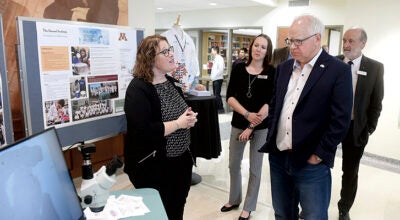Sentenced to Serve program could end in June
Published 6:48 am Monday, March 1, 2010
When the new Mower County Jail and Justice Center opens this fall, one inmate program could be missing.
Gov. Tim Pawlenty has cut the Sentenced to Serve Program — a program that puts inmates to work on community projects — in his proposed budget.
The Sentenced to Serve Program is a state program, but the county also contributes money to it. The loss of the program would mean the loss of services done by STS crews and the loss of 56 crew leaders state-wide, including Bill Klingerman, who has been the STS supervisor in Mower County for about 15 years.
“It is a win-win program, and that’s why it confounds me that they would want to cut that,” said Steve King, director of Mower County Correctional Services. “The community gets work out of their offenders, and offenders get some valuable work that they actually can feel good about.”
The cut comes at an inopportune time in Mower County, as the new Mower County Jail and Justice Center is slated to open in the fall.
King said it’s important to have programming in the new jail, so the inmates are productive and aren’t just sitting around.
The STS program reduces stress on jails, as offenders who participate in STS have time removed from their sentence, according to Mower County Sheriff Terese Amazi.
“It will mean additional prisoners in the jail,” she said.
While prisoners aren’t paid for STS work, King said they have a day removed from their sentence for each day of STS work. Without STS, prisoners will be in jail longer, which is an added cost. According to King, it costs an average of $55 a day for an inmate in a jail.
“It’s not just that you won’t have projects being done … you’re going to have people in jail longer,” King said.
Not all STS workers are inmates in the jail. Some STS workers are on probation and participate in STS to complete work service.
STS crews work on a number of projects around town. Last week, the crew worked to clean snow from fire hydrants around the city. STS workers often clean ditches, do bridge maintenance, do demolition work on building projects, and an STS crew has volunteered for Clean up Austin Day for the last three years.
Crews also do regular maintenance like mowing at township cemeteries around the county. The historical society, fairgrounds and Riverside Arena all benefit from the STS, as crews often volunteer routine clean up and maintenance at these area buildings.
The crews work on snow removal at the senior center and around the court house.
STS crews will come together to do work regionally, too. A few years ago, the Mower County STS crew worked in Rushford to clean up after a flood.
King described STS as a low cost program. The budget for STS was about $75,000 last year in Mower County. A large part of that was Klingerman’s salary and that also included some equipment costs. While STS is a state program, the county put in about $37,000 to the program last year through the corrections budget, King said.
Aside from Klingerman, STS workers aren’t paid in money for their work. Had the workers been paid $6 an hour, King estimated STS crews provided about $103,000 worth of labor around the county in 2009.
If the STS program is cut, the county and city would have to pay employees for such services if they wish for them to continue.
“I think we’re going to have fire hydrants that aren’t plowed out,” King said. “I think we’re going to have fairgrounds that won’t be as clean and trimmed. I think we’ll have old cemeteries in the townships that will probably get grown over.”
“There’s either going to be work left undone, or it’s going to be done at a higher cost to the tax payer,” he added.
Without STS, the services the program provided would have to be done by county or city employees at a much higher cost.
“These are typically projects that someone from the city or county are going to have to be doing, and you’re going to be paying them more than $6 an hour,” King said. “Our people don’t get paid anything.”
King said he’s heard it’s likely the cuts will be finalized. The STS program would discontinue by around June 1 if the program is cut.
Even if the state stops funding the project, King said the state could assist counties in taking over the program by allowing counties to keep equipment like vans, trailers and tools.
King and other county employees plan to discuss the program with the Mower County Board of Commissioners in the next few months. The board couldn’t move to fund the program until it’s officially cut, King said.
“It’s a program that works,” King said. “It’s a feel good for the community because they see the offenders giving back to the community.”





